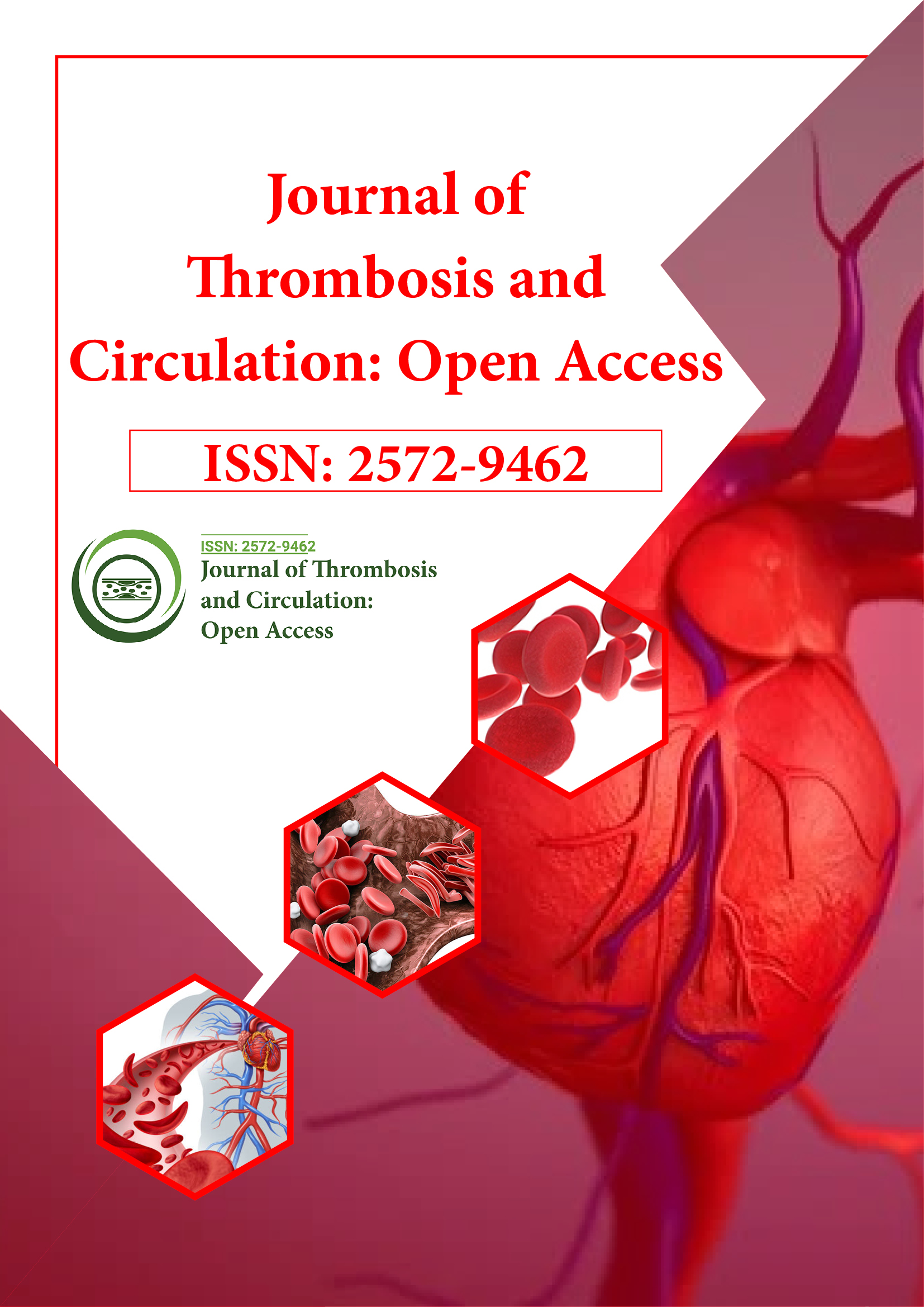Indexed In
- RefSeek
- Hamdard University
- EBSCO A-Z
- Publons
- Google Scholar
Useful Links
Share This Page
Journal Flyer

Open Access Journals
- Agri and Aquaculture
- Biochemistry
- Bioinformatics & Systems Biology
- Business & Management
- Chemistry
- Clinical Sciences
- Engineering
- Food & Nutrition
- General Science
- Genetics & Molecular Biology
- Immunology & Microbiology
- Medical Sciences
- Neuroscience & Psychology
- Nursing & Health Care
- Pharmaceutical Sciences
Opinion Article - (2024) Volume 10, Issue 1
Evaluating the Effect of Gut Microbes on the Probability of Thrombosis
Huing Gao*Received: 01-Jan-2024, Manuscript No. JTCOA-24-25351; Editor assigned: 03-Jan-2024, Pre QC No. JTCOA-24-25351 (PQ); Reviewed: 17-Jan-2024, QC No. JTCOA-24-25351; Revised: 24-Jan-2024, Manuscript No. JTCOA-24-25351 (R); Published: 31-Jan-2024, DOI: 10.35248/2572-9462.24.10.270
Description
The human gut microbiota, a different region of microorganisms residing in the gastrointestinal tract, plays an essential role in maintaining host homeostasis and influencing various physiological processes. Emerging evidence suggests that gut microbes may also impact thrombosis, the formation of blood clots within blood vessels, through complex interactions with the immune system, coagulation pathways, and endothelial function. This article explores the current understanding of the relationship between gut microbes and thrombosis, highlighting fundamental mechanisms and potential therapeutic implications.
Gut microbiota composition and thrombotic risk
The composition and diversity of the gut microbiota have been associated with thrombotic risk in both preclinical models and clinical studies. Dysbiosis, a disruption of the normal gut microbial community, has been observed in conditions associated with increased thrombotic risk, such as Inflammatory Bowel Disease (IBD), obesity, and metabolic syndrome. Alterations in gut microbiota composition, characterized by changes in the abundance of specific bacterial taxa, have been linked to systemic inflammation, endothelial dysfunction, and hypercoagulability, contributing to thrombotic susceptibility.
Gut microbiota-mediated inflammation and thrombosis
Gut microbes can modulate host immune responses and inflammatory pathways through the production of bioactive metabolites, such as Short-Chain Fatty Acids (SCFAs), Lipopolysaccharides (LPS), and bile acids. Dysbiotic alterations in gut microbiota composition can lead to increased intestinal permeability and translocation of microbial products into the systemic circulation, triggering immune activation and systemic inflammation.
Chronic low-grade inflammation, driven by gut dysbiosis and increased gut permeability, has been implicated in the pathogenesis of thrombotic disorders. Inflammatory cytokines and chemokines released in response to gut-derived microbial antigens can promote endothelial dysfunction, platelet activation, and coagulation cascade activation, predisposing individuals to thrombotic events.
Gut microbiota-host metabolism interactions and thrombosis
Gut microbes play a critical role in host metabolism and nutrient processing, influencing systemic metabolic homeostasis and cardiovascular health. Dysbiotic alterations in gut microbiota composition have been associated with metabolic disorders such as obesity, insulin resistance, and dyslipidemia, which are established risk factors for thrombosis.
Metabolites produced by gut microbes, such as SCFAs, Trimethylamine N-oxide (TMAO), and secondary bile acids, can modulate host metabolic pathways and influence thrombotic risk. For example, elevated TMAO levels, derived from gut microbial metabolism of dietary nutrients, have been associated with increased platelet hyperreactivity, endothelial dysfunction, and thrombotic events in experimental models and clinical studies.
Therapeutic implications and future directions
Understanding the role of gut microbes in thrombosis pathogenesis has important therapeutic implications for the prevention and treatment of thrombotic disorders. Modulating gut microbiota composition and activity through dietary interventions, probiotics, prebiotics, and Fecal Microbiota Transplantation (FMT) represents a potential strategy for reducing thrombotic risk and improving cardiovascular outcomes.
Several studies have explored the effects of dietary interventions, such as high-fiber diets, Mediterranean diets, and fermented foods, on gut microbiota composition and thrombotic risk factors. Preclinical and clinical studies investigating the effects of probiotics and prebiotics on gut microbiota-mediated inflammation and thrombosis are ongoing and hold potential for future therapeutic development. FMT, a procedure involving the transfer of fecal microbiota from a healthy donor to a recipient, has shown efficacy in the treatment of recurrent Clostridioides difficile infection and other gastrointestinal disorders. Emerging evidence suggests that FMT may also modulate systemic inflammation and thrombotic risk by restoring gut microbial diversity and function, although further research is needed to elucidate its therapeutic potential in thrombotic disorders.
In conclusion, gut microbes apply significant influence on thrombotic risk through interactions with host immune, inflammatory, and metabolic pathways. Dysbiotic alterations in gut microbiota composition and activity have been implicated in the pathogenesis of thrombotic disorders, highlighting the potential therapeutic relevance of targeting the gut microbiota for thrombosis prevention and treatment. Further research is necessary to resolve the underlying mechanisms and translate these findings into clinically effective interventions for patients at risk of thrombotic events.
Citation: Gao H (2024) Evaluating the Effect of Gut Microbes on the Probability of Thrombosis. J Thrombo Cir. 10:270.
Copyright: © 2024 Gao H. This is an open-access article distributed under the terms of the Creative Commons Attribution License, which permits unrestricted use, distribution, and reproduction in any medium, provided the original author and source are credited.
